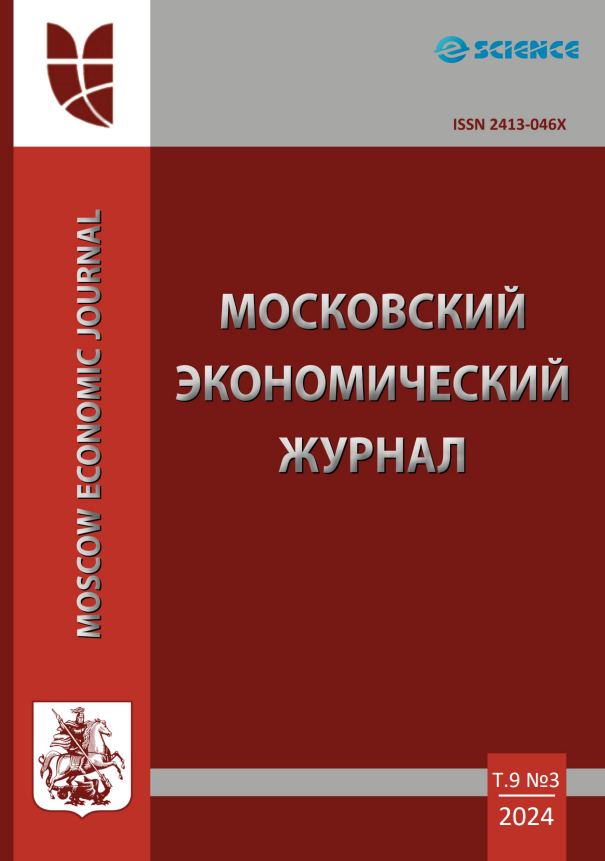UDC 332.153
The state and prospects for the development of the transport and logistics system, including its infrastructure and digital information support, directly affect the economy and society of countries and regions. In this regard, the issues of analyzing the interaction of transport, logistics and socio-economic systems and developing effective solutions for managing territories based on such analysis become relevant. At the same time, modern capabilities for processing Big Data to obtain multidimensional models of dependencies between various aspects and indicators of socio-economic systems of regions are of particular interest. The article carried out a systematic analysis of the problems of the functioning and development of transport; the effectiveness of transport planning and management processes was analyzed. The main provisions and approaches for assessing the impact of transport on the surrounding social system, limited territorially and administratively, are presented. A systematic analysis of the characteristics of the functioning and development of transport and the non-transport effect of improving transport services to consumers was carried out.
transport and logistics system, digital economy, sustainable development, system dynamics, development of the region, indicators of transport provision in the region
1. Programma «Cifrovaya ekonomika Rossiyskoy Federacii». Utv. Rasporyazheniem Pravitel'stva Rossiyskoy Federacii ot 28 iyulya 2017 g. № 1632-r.
2. Gohberg L.M. Cifrovye tehnologii v sovremennoy ekonomike i obschestve // Chto takoe cifrovaya ekonomika? Trendy, kompetencii, izmerenie, dokl. k XX Apr. Mezhdunar. nauch. konf. po problemam razvitiya ekonomiki i obschestva / Pod nauch. red. L.M. Gohberg; Nac. issled. un-t «Vysshaya shkola ekonomiki». – M.: Izd. dom Vysshey shkoly ekonomiki, 2019. – S.4-10.
3. Strategiya razvitiya informacionnogo obschestva v Rossiyskoy Federacii na 2017-2030 gg. Utv. Ukazom Prezidenta Rossiyskoy Federacii ot 09.05.2017 g. № 203.
4. Akopov A.S. Imitacionnoe modelirovanie: uchebnik i praktikum dlya akademicheskogo bakalavriata / A.S. Akopov – M.: Izdatel'stvo Yurayt, 2018. – 389 s.
5. Blaginin V. A. Ot transportnoy k transportno-kommunikacionnoy infrastrukture regiona: teoreticheskoe osmyslenie // Nauchnye trudy Vol'nogo ekonomicheskogo obschestva Rossii. – 2018. – T. 213. № 5. – S. 431-445.
6. Scherbinin Yu.A. Transport i ekonomicheskiy rost: vzaimosvyaz' i vliyanie // Evraziyskaya ekonomicheskaya integraciya, № 3 (12), 2011. – s. 65-78.
7. Nudel'man R.I. Problemy planirovaniya vosproizvodstva osnovnyh fondov transporta // Problemy prognozirovaniya i optimizacii raboty transporta: dokl. k Konf. po problemam razvitiya transporta / Pod nauch. red. L.V. Kantorovicha, V.N. Livshica – M.: Izdatel'stvo nauka, 1982. – S. 129-167.
8. L. V. Kantorovich, “Essays in Optimal Planning”, in Sociology – 1977, pp. 7-12.
9. L. V. Kantorovich, “Mathematics in economics: Achievements, difficulties, perspectives”, in Nobel Memorial Lecture – 1975.
10. Lapidus B.M., Macheret D.A. Makroekonomicheskaya rol' zheleznodorozhnogo transporta: teoreticheskie osnovy, istoricheskie tendencii i vzglyad v buduschee – m.: KRASAND, 2014. – 234 s.
11. P. Mishkurov, O. Fridrikhson, V. Lukyanov, S. Kornilov, V. Say, “Simulated transport and logistics model of a mining enterprise”, in Transportation Research Procedia – 2021, pp. 411-418.
12. M. Zhuravskaya, V. Tarasyan, “Forming of the regional core transport network tak-ing into account the alloca-tion of alternative energy sources based on artificial intelligence methods”, in Transport problems – 2014, pp. 121-130.











